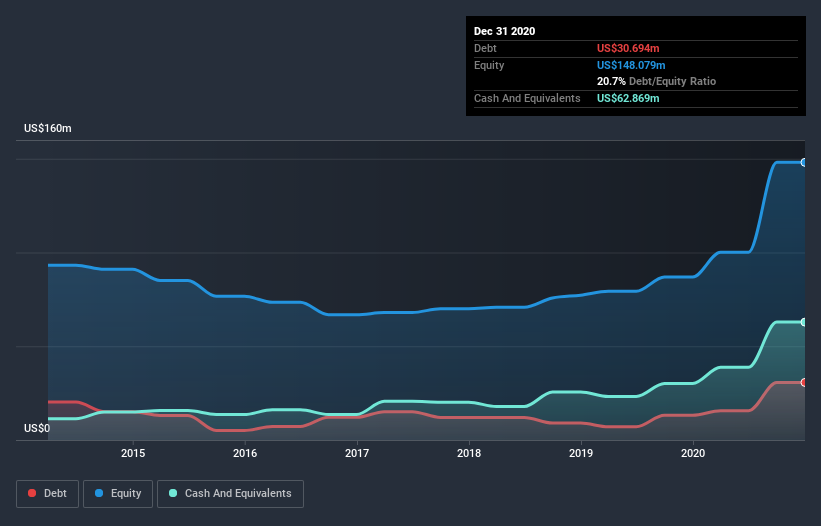The external fund manager backed by Berkshire Hathaway's Charlie Munger, Li Lu, makes no bones about it when he says 'The biggest investment risk is not the volatility of prices, but whether you will suffer a permanent loss of capital.' When we think about how risky a company is, we always like to look at its use of debt, since debt overload can lead to ruin. Importantly, Capital Limited (LON:CAPD) does carry debt. But the real question is whether this debt is making the company risky.
Why Does Debt Bring Risk?
Debt assists a business until the business has trouble paying it off, either with new capital or with free cash flow. In the worst case scenario, a company can go bankrupt if it cannot pay its creditors. While that is not too common, we often do see indebted companies permanently diluting shareholders because lenders force them to raise capital at a distressed price. Of course, the upside of debt is that it often represents cheap capital, especially when it replaces dilution in a company with the ability to reinvest at high rates of return. When we examine debt levels, we first consider both cash and debt levels, together.
Check out our latest analysis for Capital
What Is Capital's Net Debt?
As you can see below, at the end of December 2020, Capital had US$30.7m of debt, up from US$13.2m a year ago. Click the image for more detail. However, it does have US$62.9m in cash offsetting this, leading to net cash of US$32.2m.

How Healthy Is Capital's Balance Sheet?
We can see from the most recent balance sheet that Capital had liabilities of US$51.8m falling due within a year, and liabilities of US$26.5m due beyond that. Offsetting these obligations, it had cash of US$62.9m as well as receivables valued at US$19.3m due within 12 months. So it actually has US$3.87m more liquid assets than total liabilities.
This short term liquidity is a sign that Capital could probably pay off its debt with ease, as its balance sheet is far from stretched. Succinctly put, Capital boasts net cash, so it's fair to say it does not have a heavy debt load!
Also positive, Capital grew its EBIT by 30% in the last year, and that should make it easier to pay down debt, going forward. When analysing debt levels, the balance sheet is the obvious place to start. But it is future earnings, more than anything, that will determine Capital's ability to maintain a healthy balance sheet going forward. So if you want to see what the professionals think, you might find this free report on analyst profit forecasts to be interesting.
Finally, while the tax-man may adore accounting profits, lenders only accept cold hard cash. Capital may have net cash on the balance sheet, but it is still interesting to look at how well the business converts its earnings before interest and tax (EBIT) to free cash flow, because that will influence both its need for, and its capacity to manage debt. Over the last three years, Capital saw substantial negative free cash flow, in total. While that may be a result of expenditure for growth, it does make the debt far more risky.
Summing up
While it is always sensible to investigate a company's debt, in this case Capital has US$32.2m in net cash and a decent-looking balance sheet. And we liked the look of last year's 30% year-on-year EBIT growth. So we are not troubled with Capital's debt use. When analysing debt levels, the balance sheet is the obvious place to start. But ultimately, every company can contain risks that exist outside of the balance sheet. Be aware that Capital is showing 3 warning signs in our investment analysis , and 1 of those makes us a bit uncomfortable...
At the end of the day, it's often better to focus on companies that are free from net debt. You can access our special list of such companies (all with a track record of profit growth). It's free.
If you’re looking to trade Capital, open an account with the lowest-cost* platform trusted by professionals, Interactive Brokers. Their clients from over 200 countries and territories trade stocks, options, futures, forex, bonds and funds worldwide from a single integrated account. Promoted
New: AI Stock Screener & Alerts
Our new AI Stock Screener scans the market every day to uncover opportunities.
• Dividend Powerhouses (3%+ Yield)
• Undervalued Small Caps with Insider Buying
• High growth Tech and AI Companies
Or build your own from over 50 metrics.
This article by Simply Wall St is general in nature. It does not constitute a recommendation to buy or sell any stock, and does not take account of your objectives, or your financial situation. We aim to bring you long-term focused analysis driven by fundamental data. Note that our analysis may not factor in the latest price-sensitive company announcements or qualitative material. Simply Wall St has no position in any stocks mentioned.
*Interactive Brokers Rated Lowest Cost Broker by StockBrokers.com Annual Online Review 2020
Have feedback on this article? Concerned about the content? Get in touch with us directly. Alternatively, email editorial-team (at) simplywallst.com.
About LSE:CAPD
Capital
Provides drilling, mining, mineral assaying, and surveying services.
Very undervalued with adequate balance sheet.
Similar Companies
Market Insights
Community Narratives



